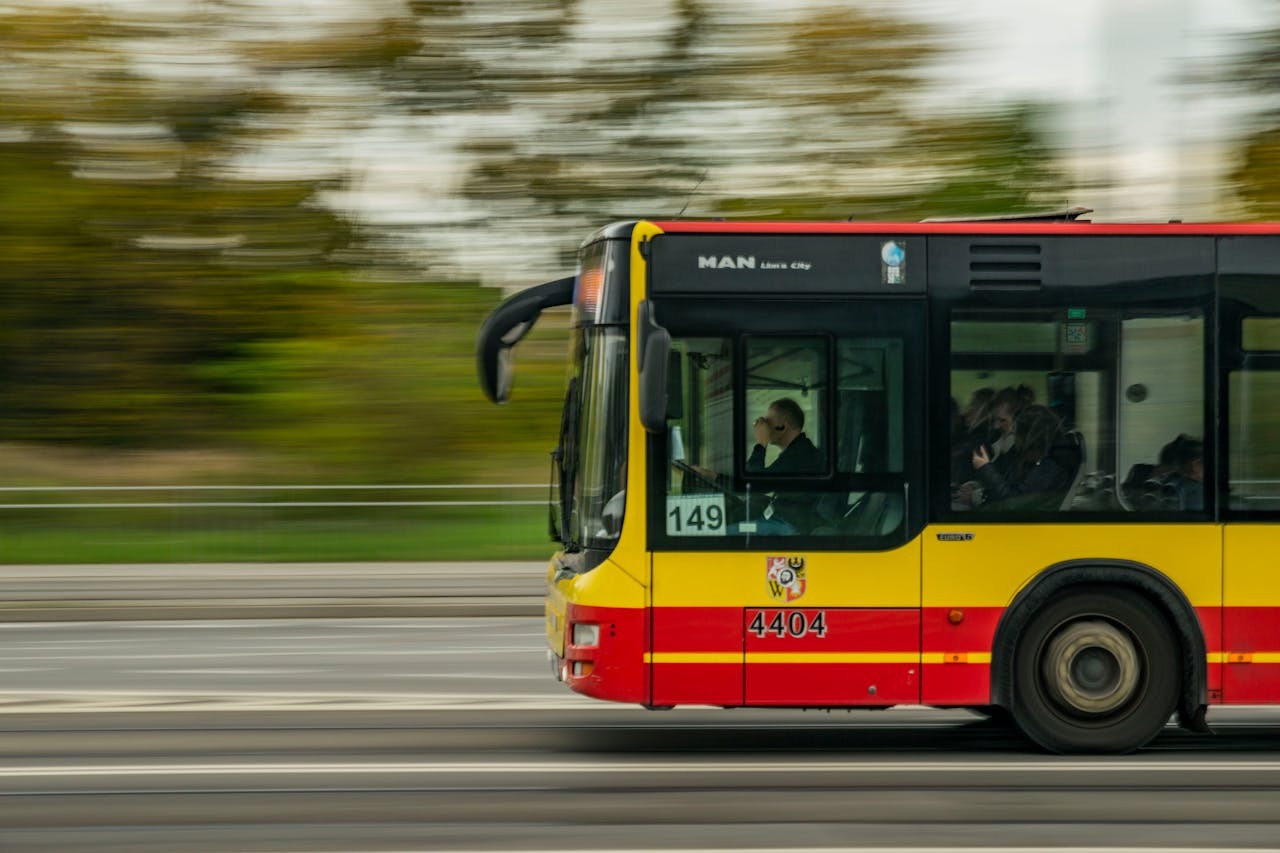Bus driving in Germany is a profession in high demand due to the country’s modern roads and the strong financial stability it offers. Germany’s well-established public transit systems contribute to the high demand for bus drivers in both urban and rural areas. Bus drivers in Germany receive competitive salaries, often with opportunities for overtime pay.
The country’s welcoming attitude towards skilled workers means that foreign bus drivers can easily find employment and benefit from integration programs to help them settle in. The ongoing need for skilled workers in transportation, coupled with the job market in Germany and its position as a global leader in commerce, has made driver roles, including bus driving, increasingly attractive to people worldwide.
We will analyse all types of salaries and provide an overview of how much does a bus driver earn in Germany. We will present what they can expect in different cities and regions, how they can add to the regular salary with overtime and bonuses, and how much do bus drivers make a year.
How Much Do Bus Drivers Make in Germany?
The salary of a bus driver in Germany varies depending on experience, location, and qualifications. However, a general overview of net salary data for 2025 provides a good sense of what drivers can expect to earn.
| Salary type | Net bus driver salary in Germany per year (EUR) | Net bus driver salary in Germany per month (EUR) |
| Average salary | 13,900 | 1,158 |
| Median salary | 12,580 | 1,048 |
| Minimum salary | 5,620 | 468 |
| Highest salary | 21,020 | 1,751 |
Bus Driver Salary in Germany per Hour
How much do bus drivers make an hour? The hourly net rate for bus drivers in Germany generally ranges between €8 and €12, depending on experience and location. In 2026, the gross average salary of a bus driver per hour was 18.33 euros. This sum may fluctuate because of overtime, collectively agreed-upon pay in the public sector, bonuses, and individual negotiations.
When compared to other European countries, bus drivers in Germany earn a competitive salary. In many Western European nations, such as France or the UK, bus drivers’ salaries often fall within a similar range, though German salaries are typically on the higher end. In contrast, Eastern European countries, such as Poland or Hungary, offer significantly lower wages for bus drivers, generally ranging from 8,000 EUR to 12,000 EUR annually.
Bus Driver Salaries by City in Germany
A bus driver’s salary in Germany can vary significantly depending on the city. Major metropolitan areas with higher living costs and greater demand for public transportation typically offer more job opportunities and higher salaries. However, the exception is Munich, the third biggest city, which ranks among the bottom three on this list. The following table compares the average bus driver salaries in various cities across Germany:
| City | Average Salary |
| Berlin | 17,620 EUR |
| Cologne | 17,020 EUR |
| Hamburg | 15,880 EUR |
| Frankfurt | 14,540 EUR |
| Dresden | 14,620 EUR |
| Stuttgart | 13,960 EUR |
| Leipzig | 13,900 EUR |
| Bremen | 13,780 EUR |
| Dortmund | 13,780 EUR |
| Nürnberg | 13,660 EUR |
| Hannover | 13,060 EUR |
| Munich | 13,100 EUR |
| Düsseldorf | 13,100 EUR |
| Essen | 12,240 EUR |
The table shows bus drivers’ salaries are higher in major cities like Berlin, Hamburg, and Cologne. According to 2024 data, bus drivers in Stuttgart have the highest earnings, with a bus driver average salary of 21.79 euros per hour. In contrast, bus drivers in Brandenburg earn the least, at 16.03 euros per hour.
Urban areas generally offer better pay due to the higher cost of living and increased demand for public transport services. In contrast, rural areas tend to have lower salaries for bus drivers as a result of lower living costs and less frequent public transit needs.
Germany Bus Driver Salary by Experience
The level of experience strongly impacts the salary of a bus driver in Germany. Entry-level drivers earn less compared to those with several years of experience, as higher levels of experience often bring increased pay due to skill development and seniority.
Entry-Level vs. Experienced Bus Driver Salary
Bus drivers in Germany can generally expect to see pay raises over time. The average bus driver salary increase per year is around 5% every 12 months. Additionally, the years of service, performance, and the specific employer can increase the raise percentages.
Below is a breakdown of the expected salaries at various experience levels along with the corresponding percentage increases:
| Experience Level | Annual Salary (EUR) | Note |
| Entry-Level (0-2 Years) | 6,760 | – |
| Mid-Level (2-5 Years) | 9,440 | 33% increase from Entry-Level |
| Experienced (5-10 Years) | 11,880 | 25% increase from Mid-Level |
| Veteran (10-15 Years) | 15,380 | 29% increase from Experienced |
| Highly Experienced (15+ Years) | 19,220 – 19,480 | 25% increase from Veteran |
The national average for all professions in Germany is around 7% every 18 months, slightly higher than the increase seen in the bus-driving profession. However, bus drivers still benefit from steady raises as they gain experience.

Additional Factors Influencing Bus Driver Salaries
Overall, a bus driver’s salary in Germany increases with experience, and opportunities for higher earnings exist with further years of service. Factors such as employer type, education level, and even gender can also impact the final salary.
Public vs. Private Operators
Bus drivers employed by public transit companies generally receive more stable employment with additional benefits like pension contributions and health insurance. These positions tend to offer a lower starting salary but provide security and the potential for long-term raises and promotions.
Working as a bus driver in Germany for private operators may earn slightly higher starting salaries, but the benefits package can vary significantly. These jobs can offer performance-based incentives or bonuses, though they might come with less job security than public sector roles.
Private sector drivers have an 8% smaller gross salary than their colleagues from the public sector:
- Public transport: 48,200 EUR
- Private companies: 44,540 EUR
Education Level
Education also plays a role in salary potential. Bus drivers in Germany with a certificate or diploma can earn about 13,060 EUR net salary annually. In contrast, those with a bachelor’s degree in a relevant field may earn around 19,060 EUR net salary. While higher education is not a strict requirement for the job, it can benefit those seeking higher pay or leadership roles within the transportation sector.
Gender
Gender can also influence salary, though pay inequality in the profession is decreasing. According to the data, female bus drivers in Germany earn slightly higher on average than their male counterparts. Female drivers earn around 13,540 EUR net salary annually, while men typically earn 11,880 EUR. This difference may reflect a range of factors, including variations in the type of routes assigned or seniority.
Additional Benefits and Allowances
In addition to the base salary, bus drivers in Germany can benefit from various allowances and incentives that enhance their overall compensation. These include overtime pay, night shift premiums, and performance-based bonuses.
Overtime
Overtime is a standard part of a bus driver’s job, especially during peak travel times or when routes run longer than scheduled. Bus drivers who work beyond their regular hours are typically entitled to overtime pay, which compensates for the additional hours worked. Overtime comes at a higher rate than regular working hours, so drivers receive adequate compensation for their extra efforts.
Night Shifts
Bus drivers who work night shifts are entitled to additional compensation for their non-standard working hours. According to the Working Time Act, work between 23:00 and 6:00 brings a 25% pay supplement on top of the regular hourly wage. The law makes sure drivers who work overnight receive additional money incentives in exchange for the change to their typical working hours. In some cases, drivers can also get extra holiday days.

Bonuses
The bonus structure contributes to a bus driver’s overall compensation package, making the profession even more attractive. While bus drivers typically do not receive high bonus rates compared to other professions, there are several bonus options they can receive:
- An individual or goal-based bonus is the most common type awarded for meeting specific targets or milestones, such as maintaining high customer satisfaction or completing routes on time.
- Company performance bonuses can be received based on the overall success and profit of the company.
- A holiday bonus is a gesture of appreciation typically paid at the end of the year or around the holidays.
However, it’s worth noting that only about 35% of bus drivers report receiving a bonus within the past year. The bonuses typically range from 0% to 4% of the annual salary.
Bus Driver Salaries in Germany vs. Other Countries
Germany’s bus driver salaries are generally considered decent, especially when combined with benefits like overtime, night shift premiums, and bonuses. Additionally, these salary packages balance the cost of living in Germany, particularly in larger cities.
| Country | Gross average bus driver wage per month (EUR) |
| Belgium | 3,964 |
| Netherlands | 3,777 |
| Germany | 3,562 |
| Austria | 3,425 |
| France | 2,527 |
| United Kingdom | 2,540 |
| Spain | 2,286 |
| Italy | 2,422 |
As we can see, Germany’s bus driver gross salary is near the top compared to the rest of Western European countries. Bus driving in Germany remains a stable and attractive profession, especially when considering the additional benefits and allowances that come with the role.
How much are bus drivers paid in Germany? – Final Summary
Bus driving offers competitive salaries and numerous benefits, making it an attractive profession for both local and international workers. With an average bus driver salary in Germany of around 1,158 euros per month, plus additional allowances for overtime, night shifts, and performance bonuses, it provides a solid income with the opportunity for career growth and stability. Furthermore, bus drivers’ salaries in Germany are higher than those of many other European countries.
Recruitment agencies often act as intermediaries between employers and job seekers, charging a fee for their services. The net wages may be lower due to services such as housing, assistance with paperwork, help settling into a new country, and job search support. These benefits are part of the entire pay package and are frequently more important for foreign workers, given the lengthy and difficult process of looking for work overseas on their own, as well as the high expenses of renting housing independently.
Bus Driver Opportunities
If you’re thinking about starting a career as a bus driver in Germany, now is a great time to explore the many opportunities available in the industry. Visit Robin Jobs to discover the latest job openings and find the perfect position that matches your preferences. Start your journey today and take the first step toward a rewarding career on the road!

 English
English  Lietuvių
Lietuvių  Latviešu
Latviešu  Polski
Polski  Português
Português  Română
Română  Slovenčina
Slovenčina  Magyar
Magyar  Русский
Русский  Espanol
Espanol  България
България  Čeština
Čeština  Italy
Italy  Croatia
Croatia  Greek
Greek 

